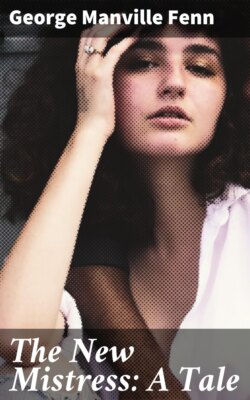Читать книгу The New Mistress: A Tale - George Manville Fenn - Страница 14
На сайте Литреса книга снята с продажи.
Disturbing Influences.
ОглавлениеHazel Thorne felt giddy as she took her seat in the front of the gallery, the seat with a little square patchy cushion close to the red curtains in front of the organist’s pew. Beside and behind her the school children sat in rows, with ample room for three times the number; but the seats were never filled save upon the two Sundays before the annual school feast when somehow the Wesleyan and Congregational Sunday-schools were almost empty, and the church school thronged.
It was precisely the same on Mr. Chute’s side of the organ, with his boys beside and behind, and so situated that he could lean a little forward and get a glimpse of Hazel’s profile, and also so that he could leave his seat, go round by the back of the organ, and give the new mistress the hymn-book, and the music used, with all the hymns, chants, and tunes carefully turned down.
It was a pleasant little attention to a stranger, and Hazel turned and thanked him with a smile that was not at all necessary, as Miss Rebecca who played the organ, and saw this through an opening in the red curtains, afterwards said to her brother the Reverend Henry Lambent, while at the time she said:—
“Sh! sh!” For Ann Straggalls was fighting down a desire to laugh, consequent upon Feelier Potts whining sharply:—
“Oh, Goody, me!”
“Like her impudence,” Mr. Chute said to himself, in allusion to Miss Rebecca’s interference with the duties of the new mistress. “She’d better not try it on with my boys,” and he went back to think of Hazel Thorne’s sweet sad smile.
And all the time the object of his thoughts felt giddy.
Archibald Graves down there, when she had believed that he had forgotten her; and the more she thought, the more agitated and indignant she grew. At times she felt as if she must leave the church, for there, plainly in view, sat the disturber of her peace, one whom she had put behind her with the past; and when at last they stood up to sing the first hymn, to her horror she found that it was the custom in the old country church for the audience all to turn and face the organ, when Archibald Graves stood gazing up at her, and, strive how she would, she could not help once or twice meeting his eyes.
“It is cruel and unmanly,” she thought, as she resumed her seat, feeling half distracted by the flood of emotion that seemed to sweep away the present.
Fortunately there was an audible “Sh! sh!” from behind the red curtains just then; and this drew Hazel’s attention to the fact that Feelier Potts was, if not “tiddling,” at all events making Ann Straggalls laugh, just when, in a high-pitched drawl, the Reverend Henry Lambent was going on with the service, as if he felt it a great act of condescension to make appeals on behalf of such a lower order of beings as the Plumtonites. What time the round smooth face of Mr. William Forth Burge was looking over the edge of his pew, where he always knelt down standing up as Feelier Potts said, and always smelt his hat inside when he came into church. And while this gentleman forgot all about the prayers in his thoughtful meditation upon the face of one who he told himself had the face of an angel, Mr. Chute kept forgetting the litany, and let the boys straggle in the responses, for he felt impelled to glance round the front of the organ pew at the soft white forehead he could just contrive to see.
“Those girls never behaved worse,” said Miss Rebecca to herself. “If this is to be the way they are kept in order she will never do.”
Miss Rebecca Lambent felt more sore than usual, for she was at heart aggrieved that the new schoolmistress should be so good-looking and ladylike—matters not at all in accordance with what was right for “a young person in her station in life;” and, to make matters worse, Jem Chubb, who blew the bellows, let the wind fail in the middle of the second hymn.
It was fortunate, then, that the girls did behave so badly, and that Feelier Potts would keep spreading out her hands, and saying, “Oh, Goody me!” in imitation of the vicar’s tones, for it took Hazel’s attention, and her task of keeping the girls quiet stayed her thoughts from wandering away.
There was no avoiding the meeting, and when at last—the service being over and the congregation going—the school children, evidently smelling dinner, having rushed off in spite of all efforts to detain them—Hazel slowly descended, it was to find Archibald Graves waiting at the foot of the stairs, and he stepped in front of Mr. Chute, who, as he was so near a neighbour, aimed at walking with the new mistress home.
“Let us go off along the road here somewhere, Hazel,” said Archibald Graves abruptly, “I have come down on purpose to see you. Never mind these people; come along.”
What should she do? Miss Rebecca was staring—nay, glowering; the Burges were coming up, and this terrible interview, which she would have given worlds to avoid, was apparently inevitable: for, unlike some young ladies she did not feel disposed to faint. What then, should she do?
The knot was untied, for just then there was a rustle of silk, and Miss Beatrice swept up over the chiselled slabs, to say, in a stern, uncompromising voice—
“Miss Thorne, my brother, the vicar, wishes to speak with you in the vestry.”
